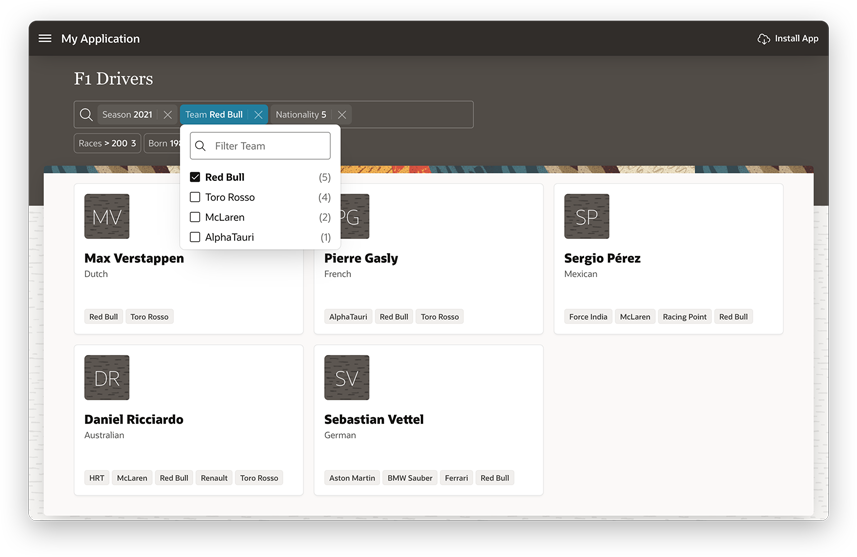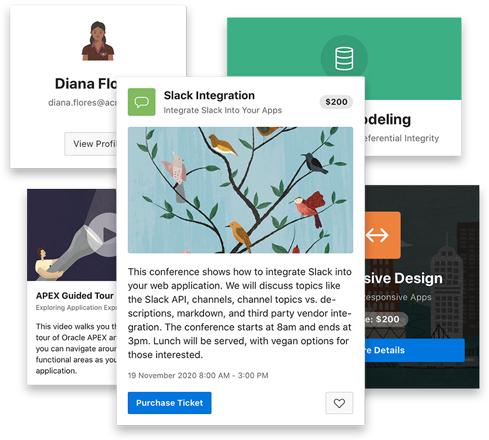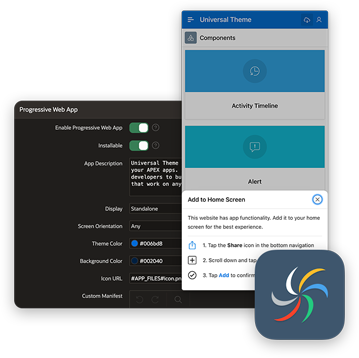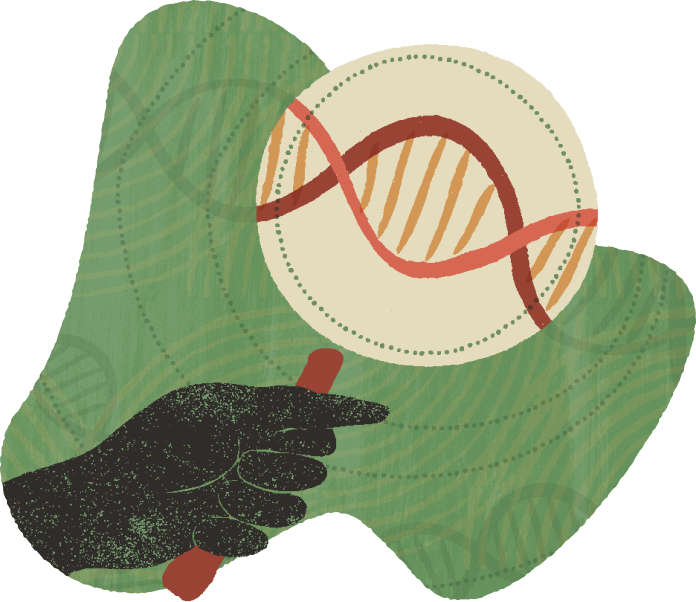Features
Oracle APEX offers all the tools you need to be productive, deliver on time, and produce stunning results for your business.
See What's New in APEX 23.2Oracle APEX minimizes the complexity involved with multi-faceted applications and provides developers with the features they need to solve business problems without needing to become experts in vast web technologies. Explore how Oracle APEX helps you build better apps by taking care of these eight facets of application development:
Data and Reporting
Oracle APEX strives to make it as easy as possible for you to display, manipulate, chart, and process data as easily and efficiently as possible. No matter where your data comes from, whether it is from a local database, remote database, or a web service, Oracle APEX features state-of-the-art functionality to help you turn data into information.
Turn Data into Information
Everybody sees data differently. With the Interactive Report component, you can empower your users to easily customize the data they see in a way that uniquely satisfies their needs. From simple changes like determining which columns to show, to more sophisticated customizations such as pivoting data, it is all within reach.
-
Search. Filter. Find.
Fast search and sophisticated filtering enable users to quickly and easily find what they are looking for. This can be achieved through full row searches, column-specific filtering, or even more complex filtering expressions such as filtering based on multiple column's values.
-
Tailored. Just for you.
Fully customize the report by applying simple formatting such as sorting and grouping the data with control breaks, enriching the data with custom highlights, computations or aggregates, or view the data in an entirely new way using charts, group by and pivot views.
-
Your Report. Remembered.
You don't need to apply these customizations and filters every time – simply save the report and all of your customizations will be remembered for your next visit. You can choose to save a report privately, just for yourself, or publicly, so it can be viewed by others.
Faceted Search
Introducing Faceted Search, a new component that enables you to quickly search and filter your data like never before. Empower your users to see data in new ways, and discover new insights, effortlessly, with just a few clicks.
-
SQL Driven
All of the filtering and computations happen directly in the database, closest to the data.
-
Auto Discovery
Facets are automatically created based on data patterns from your tables.
-
Count Computation
Facet result counts are dynamic and computed based on current filter settings.
-
Multiple Facets
There are a variety of facet types such as checkboxes, radio groups, ranges, and more.
Smart Filters and Search
Smart Filters is a new search component that allows users to quickly narrow data down with filters suggestions or search terms. Developers can use this component to provide users with a simplified search experience that eliminates clutter and provides a single control to instantly find the information they are looking for.
-
Powerful Search Bar
Smart Filters features a powerful new search bar that provides built-in auto-complete for your filters, supports searching for multiple terms, and provides easy keyboard navigation.
-
Search Suggestions
Search suggestions are at the heart of Smart Filters. These suggestions are based on the filters you have defined and are displayed as you type, or as chips below the search bar.
-
Suggestion Chips
Filters are evaluated against your data and displayed below the search bar as chips, suggesting the top search filters most appropriate for your data set.

Edit Data. Effortlessly.
Editing data should be effortless. With the Interactive Grid component, it's easy to rapidly edit multiple rows of data — as simple as clicking on a cell and editing its value. If your users are familiar with spreadsheets, they'll feel right at home, with features like row and column selection, copy down, fill, and much more. Unlock the full potential of your data in an easy to use and highly customizable way with Interactive Grids.
-
Full Featured Grid
Interactive Grid includes all the features you expect for powerful reporting, including fixed headers, frozen columns, scroll pagination, multiple filters, sorting, aggregates, and more.
-
Flexible Editing
You can easily edit your data using text, numerical columns, date pickers, list of values, and much more. Interactive Grid is designed to support all item types and item type plug-ins.
-
Master Detail. And Detail. And Detail.
With Interactive Grids, you can now easily render master-detail-detail relationships that can be n-levels deep or across. You can create all types of master-detail-detail screens with ease.
Charting Capabilities
Enjoy powerful chart and visualization capabilities in Oracle APEX with, powered by Oracle JET. You can easily add beautiful, fast, highly customizable, accessible, and extremely versatile charts to your applications with ease.
-
Responsive
These charts are fully HTML5 capable and work on any modern browser, regardless of platform, screen size, or features.
-
Highly Customizable
Through the use of a large range of declarative chart attributes, you have the flexibility to customize your charts, and make your applications soar with great visualizations, transforming operational data into actionable information.
-
Extensive Range
The charts provide dozens of different ways to visualize a data set, including bar, line, area, range, combination, scatter, bubble, polar, pyramid, radar, pie, donut, funnel, dial gauge, stock and Gantt charts.
Local. Remote. REST. Access.
It is now easier than ever to integrate data from a variety sources, whether it is from your local database, a remote Oracle database, or from any web service. You can even use Oracle APEX to publish web services using the built-in REST Workshop!
-
Consume Web Services
Easily access data from web services from a variety of REST endpoints, including ordinary REST data feeds, REST Services from Oracle REST Data Services, and Oracle Cloud Applications REST Services. In addition to supporting smart caching rules for remote REST data, APEX also offers the unique ability to directly manipulate the results of REST data sources using industry standard SQL.
-
SQL on Remote Databases
Say good bye to database links. With REST-Enabled SQL Services from Oracle REST Data Services, you can now access data and execute SQL on remote Oracle databases over HTTP and REST. Now you can easily build apps that integrate data from remote Oracle databases and allow Oracle APEX to become an application server.
-
Build REST APIs
With the completely rearchitected REST Workshop, you can easily build web services against your Oracle database objects. These service definitions are managed in a single repository and can be edited from Oracle APEX, SQL Developer, or via PL/SQL APIs. You can even generate Swagger documentation with a single click!
Forms and Automatic Data Model Processing
Form pages allow end users to view and edit a single row of data in a database table or view. Choosing from a large variety of form item types, developers can create responsive and easy to use forms that interface with the database through automatic DML processing as well as through Dynamic Actions and AJAX.
-
Automatic DML
Forms provide automatic row fetch and automatic row processing, which loads the requested row automatically from the underlying database table, maps table columns to form items and populates the form items with data. When submitting a page, all form data is written back to the database table while ensuring data integrity.
-
Optimistic Locking
To ensure that no data is lost when multiple end users work on the same data, optimistic locking is used to prevent any overwrites of data that was edited by another user at the same time.
-
Responsive Form Layouts
Using a responsive grid, form pages can be designed to make optimal use of space on larger screens, while having forms items automatically be re-arranged for use on smaller devices, such as tablet and smartphone screens.
Mobile
Oracle APEX enables developers to build modern, mobile-ready applications out of the box with minimal effort. Your APEX apps are fully responsive and can be easily installed as Progressive Web Apps (PWAs) on your device of choice, enabling deeper integration with the mobile operating system and resulting in a more native experience.
Absolutely Responsive
The Universal Theme UI for Oracle APEX has been designed from the very beginning to be fully responsive so that it works just as well on small screen as it does on larger ones.
This means that the UI components such as forms, charts, reports, and more will work seamlessly across varying screen resolutions while maintaining the same or similar functionality.
-
Smart Templates
Pages and screens across your application will automatically adjust to render is the most optimal way based on your viewport size. Zero effort required.
-
Touch Friendly
Easily integrate touch gestures or use mobile-optimized ui patterns for navigation, page layouts, and many other components.
-
Grid Layout
All components on your page are placed on top of a fluid grid system that gives you total control of the layout of your page.
-
Mobile Forms
Forms are very carefully considered and are especially optimized for mobile devices by providing a larger tap area to gain focus, and larger text for improved readability. Form labels gracefully animate on small screens to provide an intuitive and accessible experience. APEX also offers mobile friendly form elements such as dedicated number, email, and search fields, switches, radio pills, and more.
-
Mobile Components
APEX provides a library of versatile UI components and templates for Cards, Charts, Drawers, Navigation Menus, Form Controls, and a whole lot more. These components are designed with usability and accessibility in mind, and follow best-in-class mobile design patterns for instant familiarity.

Progressive Web Apps (PWA)
With a single switch, you can turn any APEX app into a Progressive Web App (PWA) and take advantage of advanced caching and improved performance. These apps can also be installed on your device of choice.
-
Enable PWA
Enabling Progressive Web App functionalities in Oracle APEX is as low-code as it can get. Turn on a single switch and allow your users to install your app in their mobile devices.
-
PWA Installation Screenshots
Your Oracle APEX application is worthy of being on a device home screen. Give your users the desire to install your app with declarative promotional screenshots, and a best-in-class install experience.
-
Offline Page
The web isn’t typically very good at dealing with offline connections. An APEX PWA offers a customizable offline fallback page.

Mobile Device Integration
Oracle APEX PWAs unlock powerful features that are usually exclusive to platform-specific applications. By installing an Oracle APEX PWA, end users can benefit from deeper integration into the device operating system, resulting in a smoother and more native experience.
-
Shortcuts
Go to a specific page of your app directly from your device home screen by doing a long-press on the PWA icon.
-
Native Share
Share an Oracle APEX page or database content with other applications installed on your mobile device.
-
Geolocation
Request geolocation data from your mobile devices, such as latitude and longitude, altitude, speed, accuracy and more.
-
Always Signed In
Allow your customers to get back into action faster with the new persistent authentication. Sign in once, stay signed in.
User Interface
Universal Theme is a user interface for Oracle APEX that enables developers to build modern web applications without requiring extensive knowledge of HTML, CSS, or JavaScript. With some working knowledge of APEX, you can use Universal Theme to easily build a responsive application that is highly accessible, easily customizable, and easy to maintain.
Versatile UI Components
Universal Theme provides the components / building blocks necessary to build practically any type of business application UI.
From Cards, Forms, Menus, Tabs, Reports, and so much more, these components have been developed with the best practices following common and popular UI patterns. You can browse all of the components provided with Universal Theme by navigating to the Components section of this application.
-
Common UI Patterns
There are a multitude of components based on common and well understood design patterns readily available to be used within your app.
-
Application Navigation
You can choose to use a tree-based navigation menu that displays to the side, a menu bar navigation near the top of the screen, or a mobile-optimized tabs display.
-
Live Template Options
Easily customize the appearance of any template-based component simply by making a selection or checking a box to get exactly the UI you want.
Easy Customization
Even for the most basic of requirements, theming and customization is a key and necessary ingredient to the success of your application.
With Universal Theme, you can effortlessly customize and fully control the look and feel of your applications without becoming an expert in UI design, HTML, CSS, or JavaScript. Using Theme Roller and Template Options, you can easily customize your application to fit your company's brand, and customize the look and feel of various components using Template Options. All of this is possible during runtime, so what you see is what you really get.
-
Theme Roller
Feeling artistic? Open Theme Roller and style your application exactly the way you want. Define custom color schemes and other settings to be used across your application. All of this during runtime.
-
Theme Styles
Not an artist? We've got you covered. There are a number of Theme Styles available out of the box for your selection. You can even configure the UI of your application programmatically and even allow users to set their own theme preference.
-
Complete Control
Have something very specific in mind? You can customize the UI of your application across the spectrum, from simple CSS overrides to building your own entirely bespoke theme and templates.
Font APEX
Font APEX is an entirely bespoke icon library designed in-house to complement Universal Theme. It contains over 1,100 distinct icons, 25 modifiers, and is available two families: Small and Large.
The tight integration of Universal Theme and Font APEX allows many components to automatically apply the large or small icons based on the styling context (such as Template Options). All you need to do is focus on the icon you want.
-
1100+ Handcrafted Icons
We take icons seriously. So we designed our own icon library to perfectly complement Universal Theme and Oracle APEX with over 1,100 distinct glyphs.
-
Two Families. One Library.
There are two families of icons in Font APEX: small and large. Small icons are based on a 16x16 grid and ideally suited for buttons and menus. Large icons are based on a 32x32 grid and well suited for places where you need to provide a larger graphic, such as cards, media lists, and hero regions.
-
Modifiers. Check.
You can easily customize each icon to apply rotations, animations, or even a modifier icon on top. Simply add the appropriate helper class to the icon, or use the built in Icon Builder in the Universal Theme app.
Security
Oracle APEX is designed to build web apps that are highly secure out of the box. In a world of constantly changing web standards and increasingly resourceful attackers finding new ways to hack sites, our focus on security means that your applications stay protected.
Authentication and Authorization
Authentication is the process of identifying who is accessing the application, while Authorization defines whether the user has permission to use an application, or parts of it.
-
Authentication Schemes
Oracle APEX comes with a comprehensive set of built-in authentication schemes that make it simple to integrate with Cloud-based authentication providers, your company's LDAP repository or using the local Oracle APEX workspace repository.
-
Authorization Schemes
Define access to your application, pages and page components with authorization schemes. Use the built-in Application Access Control to manage users and roles.
-
Extensibility
Developers can easily extend Oracle APEX by writing custom authentication and authorization schemes in SQL and PL/SQL.

Session Management
Server-side session management for a user's interactions with an application is an intrinsic part of Oracle APEX.
-
Session Control
Sessions are defined by a browser cookie value and an ID in the URL, which are long random values that an attacker can not guess to take over a user's session. Built-in timeouts guarantee that the session automatically terminates when a user is away for too long.
-
Item Session State
Application and page items save their values in session state, optionally in an encrypted form. Developers can access and manipulate the values in SQL and PL/SQL via bind variable syntax, which prevents SQL Injection.
-
Collections
Oracle APEX Collections are non-scalar, multi-row and multi-column session data. Developers can manage collections via PL/SQL APIs and views.

Secure By Default
While providing full control to developers, Oracle APEX generates applications with highly secure settings, right out of the box.
-
Parameter Tampering Protection
Oracle APEX uses checksums to prevent users from manipulating parameters in the URL and when saving changes. Attackers are not able to send their victims forged URLs that execute unwanted actions when clicked.
-
XSS Prevention
Cross-Site Scripting (XSS) occurs when attackers save malicious data in a web site and the site renders this data as code that executes in the user's browser. Oracle APEX components escape all output by default to prevent this class of attacks.
-
Advisor and other tools
Developers can run the Oracle APEX Advisor to check their applications for settings that make the application less secure, or inconsistencies that could be exploited by attackers. There are also third party tools available that offer extensive analysis of applications for vulnerabilities.

Accessibility
Oracle APEX is designed to make it as easy as possible for developers to build highly accessible web apps, that provide an inclusive user experience for users with different abilities and requirements. With every release, we strive to make this easier than ever, with new accessibility-specific functionality being added, known accessibility bugs being fixed, and ongoing improvement of our own testing strategies, all in the aim of providing a tool with a fantastic developer, and user experience for everybody.
Accessibility. Out of the box.
Oracle APEX is built with accessibility in mind at every point of the development cycle, from design through to delivery. One of the key aims is to provide out of the box accessibility wherever possible, such that an app built with the standard, default features of Oracle APEX should display a good degree of accessibility with minimal effort.
-
Accessible UI Components
Oracle APEX includes a comprehensive set of modern UI components, built to Oracle's accessibility guidelines.
-
Theming
Beautiful and accessible app theming with the Universal Theme. Easily customizable look and feel, for both developers and end-users through Theme Styles.
-
No modes required
Following modern guidelines now means we no longer require the use of accessibility modes to be accessible, making it even easier for both Oracle APEX developers and end users.

Developer Assistance
Although the framework will provide a good degree of accessibility out of the box, it is still the responsibility of the developer to ensure their Oracle APEX app truly provides a great experience for all users. We therefore provide some key functionality and resources to help you achieve this.
-
Advisor Checks
Accessibility checks built into the app Advisor, to allow you to identify some accessibility issues early in the development process. These include checks to identify page items without appropriate labelling, or pages with no page title.
-
Universal Theme Contrast Checking
Color contrast checks built into Theme Roller, allowing a designer to validate text contrast against WCAG 2.0 color contrast guidelines.
-
Accessibility Guide
Fully documented Accessibility Guide, including a section dedicated to Developing Accessible Apps, guiding you through the points of the framework that affect accessibility.

Useful Resources
So you need to address accessibility with your Oracle APEX apps and want to know more, perhaps in understanding what accessibility guidelines we follow, or the current known accessibility issues in the framework? Oracle provides all this key information for you.
-
Oracle Accessibility Guidelines
Built to the Oracle accessibility guidelines, for further information please visit Oracle's Accessibility Philosophy and Policies, under 'Guidelines and Standards'
-
Conformance Statement
Published Voluntary Product Accessibility Template (VPAT), describing how well we meet these guidelines, including details of significant defects.
-
Known Issues
With every release, we report any less significant known accessibility issues in our Release Notes. This will include bug numbers, and workarounds where possible.

Monitoring
Monitoring and logging provide insight into how users interact with your application. This information can be indispensable in identifying hacking attempts, performance issues and application errors. With Oracle APEX you are covered, because monitoring and logging are already built in.
Activity Monitoring
Oracle APEX automatically logs events that occur when your application is used and developed. This information is stored in a rolling fashion, so old data automatically goes away after a period of time that administrators can control.
-
Application Runtime Activity
Oracle APEX logs login attempts, access to any page (including page rendering time) and access to remote web services.
-
Developer Activity
Whenever a developer modifies an application, Oracle APEX stores the event for later auditing.
-
Comprehensive Reporting
A varied collection of pre-defined reports are available, for example to check for errors, check for changes in application performance or to search for specific events that have taken place.

Code Instrumentation and Tracing
Oracle APEX can emit highly detailed diagnostic data, which can help in finding bugs or performance issues in applications. Administrators are able to enable diagnostic logging for specific user sessions, or for the whole instance. Developers have easy access to diagnostic output, with reporting pages available in the Oracle APEX development environment.
-
Debug Mode
Debug Mode controls the level of diagnostic output, from 1 (errors) to 9 (Oracle APEX engine internal information). Developers can use the same instrumentation framework to add diagnostic code to their application code.
-
Development Cycle Integration
Developers can directly enable debug mode and see debug output for their test session, via the browser's developer toolbar.
-
SQL Trace
Use SQL Trace to get execution plans and wait events for SQL statements.

Globalization
Globalization is the ability of a development framework to support developing applications that perform well and correctly in a multiple languages and locales environment. Oracle APEX is designed with globalization in mind, this includes support for translating applications as well as localization, i.e. adapting an application to support a specific language and locale.
Translations
Translation allows running applications in multiple languages without having to duplicate the application logic.
-
Translatable Application Attributes
Most declarative attributes that define text such as page and region headings, field labels and column headings are automatically included when translating an application.
-
Translatable Messages
When using custom PL/SQL regions or processes or custom JavaScript, shortcuts can be used to reference translatable messages at runtime.
-
XLIFF-based translation
Translatable application attributes and messages are exported as an XLIFF file during translation. XLIFF is an standardized, XML-based format for passing translatable data between different tools.

Localization
Format and display content in the application based on where the end user is located.
-
Number Formatting
Show numeric data with the appropriate decimal notation depending on the territory.
-
Time Zones and Territories
Render date and time data using the appropriate date and time format and automatically convert to the locale of the end user.
-
Right-to-Left Support
Render right-to-left languages automatically in the proper document direction when using the Universal Theme.

Workflow & Process Automation
Oracle APEX has built-in components that form the heart of the future Workflow and Process Automation vision. The Approvals components and Unified Task List can fulfill an essential portion of that vision, with more to come in the subsequent releases.
Approvals and Unified Task List
With the new approvals components, you can deliver solutions requiring human approvals in record time. Define tasks in any application that users initiate from any page and approvers process using a single Unified Task List.
-
Unified Task List
Create an Inbox page showing all human tasks requiring a user's attention.
-
Task Definition
Configure task parameters, participants, and actions, then generate a Task Details page.
-
Simple Task Processing
Create and manage human tasks with built-in processes, new views, and a PL/SQL API.
-
Sample Approvals App
The new Sample Approvals App has everything you need to get started!
The Approvals component has been enhanced to include additional capabilities. Configure due dates, expiration policies, action logging, and more.
-
Deadline Region
Deadline region in Task Definition to configure Due On dates and Expiration Policy of Tasks.
-
More Actions
New capabilities in Task Definition Actions with configuration of Action Logging, API to add to the Task History Log, Before Expire and Expire Events.
-
More Operations
New operations are available on the Task Details Page to Request Information, Submit Information, Change Due Date, Invite Participant, Renew and Cancel a Task. You can also copy Task Definitions.

Integration with External Process Automation Systems
Oracle APEX can be combined with external Process Automation Systems that supports BPMN.
-
OCI Process Automation Service (OPA)
OPA is a native service for developers and business experts to quickly automate approval workflows. Simplify repetitive tasks with reusable business rules, prebuilt integrations, and low-code designers. You can utilize the OCI Process Automation Service (OPA) via its exposed REST Services and allow APEX to instantiate a Process on OPA side and get its status.
-
Flows for APEX
Flows for APEX is an open source extension to APEX that is developed by the APEX community with support and assistance from Oracle. It can be used to model your business processes with BPMN, develop your process steps in APEX, and monitor your running processes with the Flows for APEX application.
-
3rd Party Process Automation
The doors are wide open to integrating with virtually any external 3rd party digital process automation services by consuming its REST endpoints, REST enabled SQL, or Database Links.